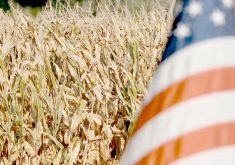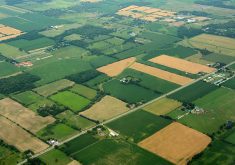Minnedosa, Man. – The federal government promises to spend $1.5 billion over the next nine years to increase the supply of biofuel in Canada, announced Vic Toews, president of the Treasury Board.
The $1.5 billion will cover the cost of a 10 cent per litre subsidy for ethanol producers, like Husky Energy, and a 20 cent per litre subsidy for producers of biodiesel.
The subsidy, or financial incentive, as it’s described in a federal government news release, is needed to ensure a viable biofuel industry in Canada, which will in turn help reduce greenhouse gas emissions across the country, Toews said during an Aug. 24 news conference at the Husky Energy ethanol plant in Minnedosa.
Read Also

Farmers asked to keep an eye out for space junk
Farmers and landowners east of Saskatoon are asked to watch for possible debris in their fields after the re-entry of a satellite in late September.
“Our government will invest up to $72.8 million, over seven years, in this Husky Oil Ltd. ethanol plant,” he said.
“This is part of our Ecoenergy for Biofuels initiative, that entire initiative is a $1.5 billion investment to increase our capacity to produce cleaner fuels, reduce emissions and build a strong, competitive biofuels industry.”
The release states that grain-based ethanol can reduce GHG emissions by 40 percent compared to gasoline. And for biodiesel, the emission reductions are closer to 60 percent.
It would also provide new markets for low quality grain, a boon for farmers, but it could also drive up feed prices for livestock producers.
The $72.8 million estimate is based on Husky producing 130 million litres of ethanol annually at its Minnedosa plant.
Ethanol producers will receive an operating incentive of up to 10 cents per litre for the first three years.
However, ethanol plants can receive the subsidy for only seven years and the rate of the incentive declines after the first three years.
Similarly, biofuel producers will receive an incentive of up to 20 cents per litre for three years, with subsidy rates declining afterward.
The Minnedosa announcement comes on the heels of an Aug. 21 news conference at an ethanol plant in Hamilton, Ont., where the Minister of natural resources, Lisa Raitt, touted the same program.
Money available
The ecoenergy program is part of the federal government’s Economic Action Plan, and funding for the initiative is already in the federal budget, Toews said.
During the event in Minnedosa, Bob Baird, Husky’s vice-president of upgrading and refining, said his company has received an estimated $6 to $7 million in federal money, as part of the program.
To explain why Husky needs the cash injection, Baird noted that until a five percent ethanol content is mandated across Canada, in 2010, the market for biofuel is tenuous.
“Until it’s mandated … there is an option, right. So if they (the public) are not interested in paying for the ethanol, then the problem becomes you can’t make a profit with it,” he said. “Anytime you’re in a new business, the market has to adjust. And until that market adjusts, you have to keep the incentive going to do it. It’s not just us … the grain producers have to have an outlet.”
Len Derkach, Conservative MLA for the Russell constituency, said the incentive program is great news for farmers in western Manitoba.
“For our grain producers, an announcement like this is very positive,” he said.
“The agriculture industry has been under some stress in the last few years, and this is just another avenue for moving our product into the marketplace and it’s certainly welcome.”
In addition to the benefits for Canadian grain producers, Baird said the ecoenergy program allows Canadian ethanol plants to stay competitive with American plants.
“You do have some lower cost ethanol plants in the U.S., because they produce huge quantities, that could export easily into Manitoba and other provinces.”

















